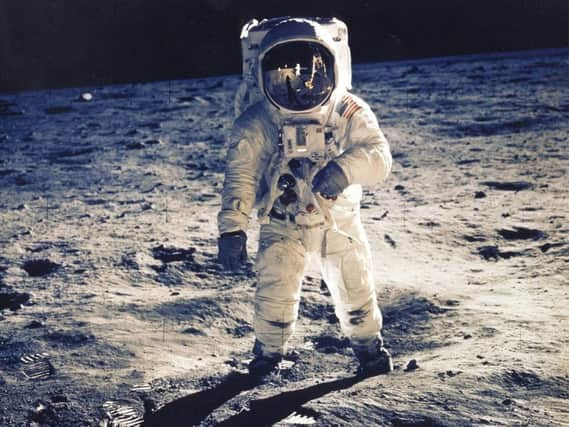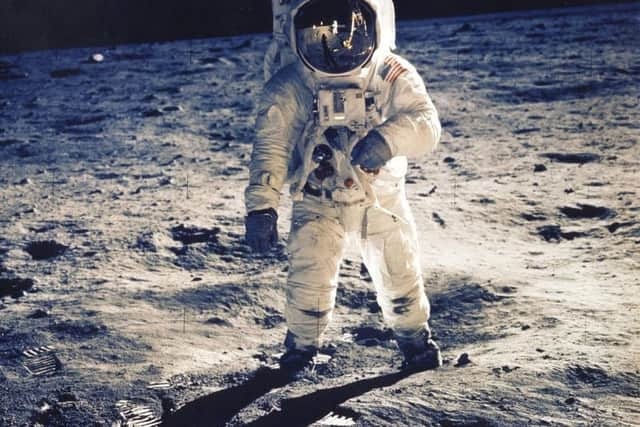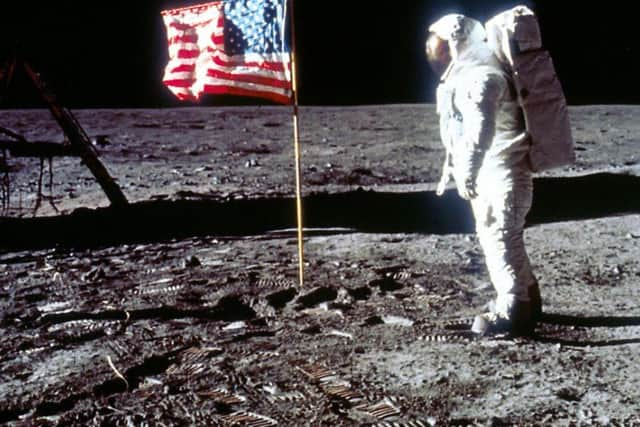How man got to the moon: The extraordinary story of the Apollo 11 mission


It was a bold speech, delivered by a young President who had invigorated his nation. Many of his listeners under the blistering sun must have questioned whether John F Kennedy had been swept away by his own bombastic rhetoric.
Advertisement
Hide AdAdvertisement
Hide Ad“We choose to go to the moon!,” he told the audience at the dedication of NASA’s new manned spacecraft centre in Texas. “We choose to go to the moon in this decade and do other things - not because they are easy, but because they are hard. Because that goal will serve to organise and measure the best of our abilities and skills, because that challenge is one that we are willing to accept, one we are unwilling to postpone and one which we intend to win.”


It was September 1962 and America was losing the space race, which had become a high profile and incredibly costly extension of the Cold War. The previous year, the Soviet Union’s Yuri Gagarin had become the first man in space. But who would win the race to the moon?
Kennedy had been brought up to never contemplate finishing in second place. So he immediately committed a colossal amount of revenue and expertise towards ensuring that an American would be the first person to stand on the moon. And he demanded that this mission be completed before the end of the 1960s, which must have seemed a very tall order, given that man had barely ventured off the planet. An expedition of 240,000 miles was fraught with dangers, to put it mildly.


Exactly half a century ago, Kennedy’s deadline was met when Neil Armstrong and Buzz Aldrin explored the lunar landscape in front of a television audience of 600 million people. At the time, nobody would have argued with Armstrong’s analysis as he set foot on the moon dust: “That’s one small step for man, one giant leap for mankind,”
Advertisement
Hide AdAdvertisement
Hide AdArthur C Clarke predicted that the Apollo programme would be the only achievement by which our age will be remembered in a thousand years’ time.
Over the last half century, the moon landings seem to have lost their ability to inspire awe. Like the voyages of Christopher Columbus, they have become another item on a dry list of mankind’s milestones for the history books.
But the 50-year anniversary is the perfect time to pause and remember the courage, stamina and skill of everyone behind the Apollo programme, which set new boundaries for human ingenuity and endurance. These advances were not without cost in human lives.
Tragedy had struck in 1967, when a fire on the ground inside the Apollo 1 Command module killed its three crew members, Gus Grissom, Ed White and Roger Chaffee. Displaying stoicism and quiet dignity, the team behind the Apollo project ploughed on, as the clock ticked towards the deadline set by the late President.
Advertisement
Hide AdAdvertisement
Hide AdThe following year, Apollo 8’s flight around the moon brought pride to an American nation that was reeling from the Vietnam war and the assassinations of Robert Kennedy and Martin Luther King. One of the crew members, Bill Anders, took a photograph of the earth, rising beyond the moon. It was a portent of the victory to come.
Andrew Chaikin, in his superb book A man on the moon - the voyages of the Apollo Astronauts wrote: “In the last days of 1968, there was a single image - pure, awesome even holy - to counter a year’s worth of violence. It was a photograph of the earth, rising beyond the battered and lifeless face of the moon. Even as Vietnam threatened to become a war America could not win, here was an American triumph.”
The achievements of Apollo 8 were to be eclipsed by Apollo 11, which touched down on July 20 1969. Those on board knew the high stakes, with both Michael Collins, the member of the team who stayed in lunar orbit, and Armstrong placing the odds of completing the mission at around fifty-fifty.
Armstrong’s genius as a pilot secured a safe landing for the Eagle lunar module. On the descent, alarms had gone off inside Eagle to signal a computer overload. They failed to unnerve Armstrong, who also stayed calm when he found himself heading for a vast crater full of boulders.
Advertisement
Hide AdAdvertisement
Hide AdHe faced the toughest parking manoeuvre in history with only about 30 seconds of fuel remaining. But they landed safely, and so gently that neither Aldrin nor Armstrong noticed the contact in the aptly named Sea of Tranquility.
Chaikin wrote: “Then there was a moment of quiet, and the two men turned to one another in the tiny cabin. Their eyes met, their bearded faces grinned at each other inside bubble helmet, and their gloved hands clasped. Armstrong keyed his mike. ‘Houston. Tranquility Base here. The Eagle has landed’.”
Kennedy’s boldness had been vindicated. The US had triumphed in the space race. Samples brought back by Armstrong, Aldrin and subsequent moonwalkers have provided insights into the moon’s formation four billion years ago, which was probably after a collision between earth and another planet.
However, it did not signal the start of an era when man ventured to other frontiers in space. No man has walked on the moon since 1972. In the US, the feelgood factor brought by the moon landings soon faded.
Advertisement
Hide AdAdvertisement
Hide Ad“The moon landings resulted in an intense but short-lived sense of optimism and pride in the United States,” says Sean Fear, a lecturer in international history at the University of Leeds.
“They took place during a period of acute social and political unrest. Scenes of Neil Armstrong and Buzz Aldrin landing on the moon generated an outpouring of pride, solidarity, and nostalgia for more peaceful times in the United States. American politicians were quick to capitalise, including President Richard Nixon, who spoke with the astronauts on live television, and declared that “For one priceless moment in the whole history of man, all the people on this earth are truly one.”
But, Mr Fear adds, the optimism inspired by the moon landings was fleeting as scandals connected to the Vietnam War unfolded, a global economic downturn took hold in the early 1970s and the Watergate scandal eventually forced Nixon from office in 1974.
After his return to Earth, Armstrong said he hoped the first lunar landings would inspire people to believe that apparently impossible problems could be solved. Today, our focus is on our own fragile planet as it faces crises caused by global warming, geopolitical tensions and scarce natural resources.
Advertisement
Hide AdAdvertisement
Hide AdBut the Apollo programme, which defied the tightest of deadlines to send a man on a round trip to the moon, must inspire anyone who believes we can solve our most intractable problems. It showed what mankind can achieve when its finest minds are combined with a fearless passion for exploration. The footprints on the moon can guide us to greater glories.
Neil Armstrong's visit to Leeds
Twenty years ago, Armstrong conveyed his boyish thrill at landing on the moon when he spoke at the Yorkshire International Business Convention at Harewood House in Leeds.
“For most of man’s history the moon has hung overhead,” he said.
“It was and is the dominant object in the sky. It was unknown, unreachable.
Advertisement
Hide AdAdvertisement
Hide Ad“But just three decades ago, I found myself in the remarkable position of trying to go there and actually believing it was possible.
“I remember during the flight looking at the earth and it had become this complete sphere.
“It was just floating away from us, into the inky black sky and I said to myself ‘Boy, this time you’ve really gone and done it.’”